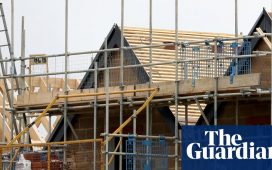Until last summer, there were few concrete links between a slowdown in China’s property sector and a domestic shadow banking industry that has for years supplied middle-class savers with high-interest products.
But that suddenly changed in July when longstanding wealth management group Zhongzhi ran into payment difficulties, making it the focal point of concerns about a potential spillover from a real estate cash crunch that has since worsened.
In the intervening six months, the conglomerate has unravelled. In November, it admitted it was severely insolvent and its management had “run wild” in the wake of its founder’s death. Recently, it declared bankruptcy.
While developer Evergrande was for years the subject of warnings over a default that eventually materialised and remains locked in negotiations with creditors, Zhongzhi’s issues emerged out of the blue and were rapidly addressed by authorities.
The speed of its fall is indicative of government concern over the prolonged slowdown in China’s vast real estate industry and adds to uncertainty over the country’s economic and financial trajectory.
“All in all, Zhongzhi’s bankruptcy filing points to the rippling effect of real estate and some failures in the shadow banking sector,” wrote Alicia García-Herrero, chief Asia-Pacific economist at Natixis, in a note on Thursday.
“Although trust companies have reduced their exposure to real estate, the uncharted waters of wealth management products by non-bank entities can pose more credit risks.”

How does Zhongzhi fit in China’s financial system?
Zhongzhi was founded in 1989 by Xie Zhikun, who worked in timber and real estate. The company evolved into a sprawling conglomerate that included five asset management businesses, four wealth managers and a stake in Zhongrong, a trust company — part of an industry that funnels retail and corporate savings into investments.
Its complex structure in part reflects the development of China’s financial system, which has evolved dramatically since liberalisation in the 1990s. Informal or loosely regulated investment products, often seen as a means of channelling money into property and in some cases sold directly by developers’ wealth management arms, have been widely sold to investors in China. One Zhongzhi product seen by the Financial Times offered a return of 8 per cent.
By international standards, little information was publicly available about Zhongzhi until its bankruptcy. According to its website, its assets total Rmb1tn ($140bn). However, in an open letter to investors last year, it said it had assets of just Rmb200bn, compared with obligations of Rmb460bn.
The bankruptcy filing said the company was 76 per cent owned by Zhonghai Shengfeng (Beijing) Capital Management, an investment company that as of 2019 was owned by Xie, who died in 2021. The remaining 16 and 8 per cent is owned by individuals Liu Yiliang and Xie Rutong, respectively Xie’s business partner and daughter.
What went wrong?
The first sign of trouble came in the summer of 2023, amid widespread speculation on Chinese social media over the company’s health and missed payments at Zhongrong.
It is unclear exactly how much Zhongrong has invested in the property sector, but the trust industry in general has come under pressure from regulators to reduce its exposure to real estate.

In late July, companies listed on the Shanghai stock exchange said Zhongrong — which is not mentioned in the bankruptcy filing — had failed to make investment payments. Retail investors in Zhongzhi’s wealth management arms gathered at its headquarters in August, prompting a large police presence. The protests quickly dissipated.
The bankruptcy filing cited Zhongzhi’s involvement in court cases brought over the summer by Shanghai Pudong Development Bank and Shandong Energy, both related to unpaid funds or debts. These cases are ongoing. The filing stated there was an “obvious lack of repayment ability” at Zhongzhi, given the difference between its assets and liabilities.
In a letter from the business to investors made public in November, the company cited the death of Xie as one reason for the company’s problems. In the same letter, it said management “ran wild” as authorities launched an investigation into “suspected illegal crimes”.
Why is this bankruptcy different?
The most significant aspect of Zhongzhi’s bankruptcy filing is the speed with which the court accepted the application and with which authorities in general have moved. This follows President Xi Jinping’s call in November for “fast discovery and speedy resolution” of financial risks.
It contrasts with the situation at Evergrande, the world’s most indebted property developer. Its default in 2021 sparked an ongoing liquidity crunch across China’s real estate sector. HNA, a conglomerate that borrowed heavily overseas, was also embroiled in years of delays before a bankruptcy plan was approved by creditors in late 2021.
Zhongzhi, based on the bankruptcy filings, is much smaller than Evergrande or its peer Country Garden, which reignited real estate concerns in recent months after it similarly missed payments on international debt. It is domestically-focused and its bankruptcy is unlikely to trigger the kind of legal and restructuring processes arising from offshore liabilities.
Some observers also suggested the speed of the resolution implied the situation was “not as sensitive” as with more high-profile banking institutions.
What happens next?
The failure of Zhongzhi has highlighted the extent of uncertainty over the health of China’s financial system at a time when the government is cracking down on the flow of information and parts of its once-booming property sector are paralysed by inactivity.
Analysts have largely said they see limited spillover from the case of Zhongzhi. At a UBS conference in Shanghai this week, Tao Wang, chief China economist at the Swiss bank, said she “did not see the impact on the financial system per se as significant”.
Reinforcing this idea, Zerlina Zeng, head of east Asia corporates at CreditSights, said its savers were largely ultra-high net worth individuals and as such less likely to protest than the middle-class holders of banks’ wealth management products.
Zhongzhi’s investments were mainly unlisted stocks and bonds, she said, adding that its failure was unlikely to move public markets, which had already priced in any broader impact.
However, China’s shadow financing industry, which based on available data now plays a less significant role than before the Covid-19 pandemic, is by its nature highly opaque.
Zeng added that many of Zhongzhi’s products were “sold via off-balance-sheet channels”, meaning they “won’t be necessarily booked in the court filings” and that “these assets won’t be part of the winding-up procedure”. This could mean that Zhongzhi’s failure will take longer to resolve.
“The actual systemic impact of Zhongzhi’s bankruptcy would be limited since its crisis has been brewing for years, and its risk exposures are not cross-held by other financial institutions,” said Larry Hu, economist at Macquarie. “But the fallout could continue to hurt investor and market sentiment.”











